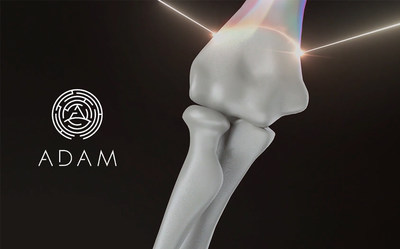ADAM, a 3D bone printing project that has already secured partnerships with ARMI, Stanley Black & Decker, and Big Pharma, is just months away from launching the first clinical trials.
GROTON, Connecticut, Oct. 8, 2019 /PRNewswire/ -- ADAM, a 3D bone printing project that has already secured partnerships with ARMI, Stanley Black & Decker, and Big Pharma, is just months away from launching the first clinical trials. But the project's ambitions reach much further than simply creating bones.

ADAM stands out from other biotech printing projects thanks to its improvements in speed and precision. At the same time, it has cut the standard production cost of synthetic bones in half, from $0.12-$0.15/cm2 down to just $0.08. ADAM uses Kwambio printers to create bones from ceramic bioglass and modified biopolymer.
The low production costs would open up transplant accessibility to the thousands of people each year who delay or forego necessary bone transplants due to exorbitant costs or lack of availability.
More than 150,000 people have died in the past 20 years waiting for transplants. In the United States, someone in need of a knee replacement can expect to pay around $50,000 for the procedure. Meanwhile, other types of bone damage require painful bone grafts or long waits for transplants.
By giving people access to custom-made bones at the push of a button, the ADAM project has huge implications for our perception of the human body, as well. In an age in which modern medicine has fortified humans against many health risks, serious bone damage due to accidents, disease, or old age remains a very real threat to quality of life. ADAM says it's time to change this.
Volodymyr Usov, CEO of ADAM, believes a smarter solution is long overdue. "It's definitely time to reshape our attitude towards bodies and find new solutions. We are confident that we are doing the right thing for all people, and that is the strongest motivation."
Alongside 3D-printed bones, ADAM is also developing Digital Body Atlases. These would allow individuals to precisely replicate their bones as needed.
The Atlases promote a proactive rather than reactive response to bone damage. Instead of waiting until something goes wrong to think about solutions, individuals would have complete body scans on hand to serve as blueprints for repair down the road.
Pre-clinical trials should be completed this month and the first human trials will begin by the end of 2019.
Contact:
Volodymyr Usov
CEO
vu@adamproject.org
Dmytro Skomorohov
+1(860)796-6976
![]() View original content to download multimedia:http://www.prnewswire.com/news-releases/affordable-3d-printed-bones-on-the-edge-of-mass-adoption-thanks-to-adam-300933248.html
View original content to download multimedia:http://www.prnewswire.com/news-releases/affordable-3d-printed-bones-on-the-edge-of-mass-adoption-thanks-to-adam-300933248.html
SOURCE ADAM




